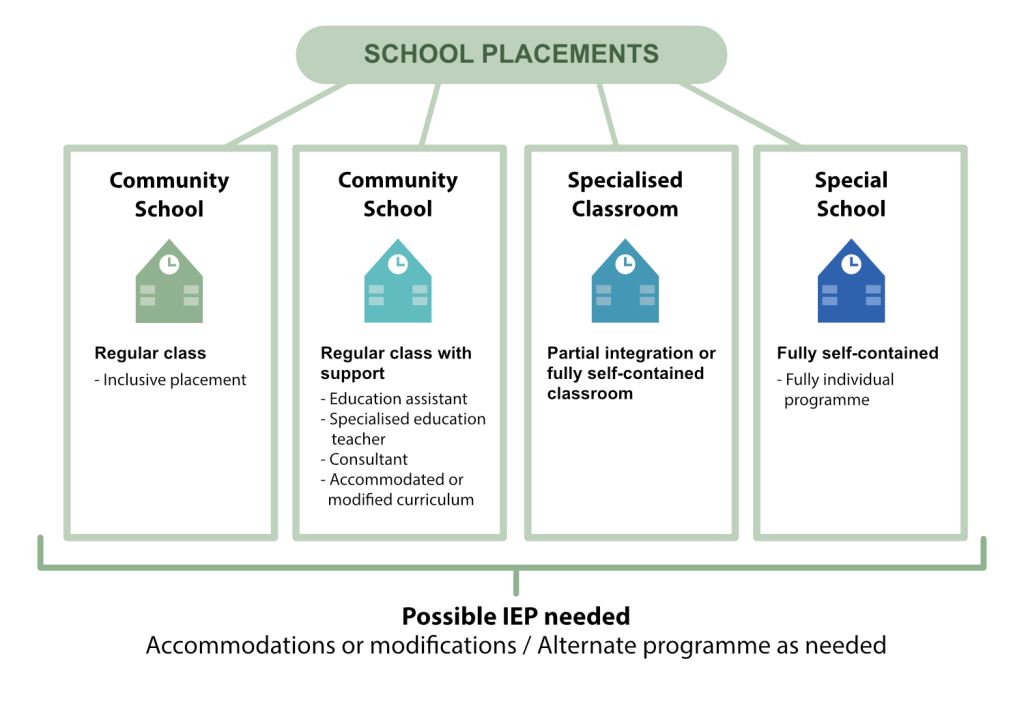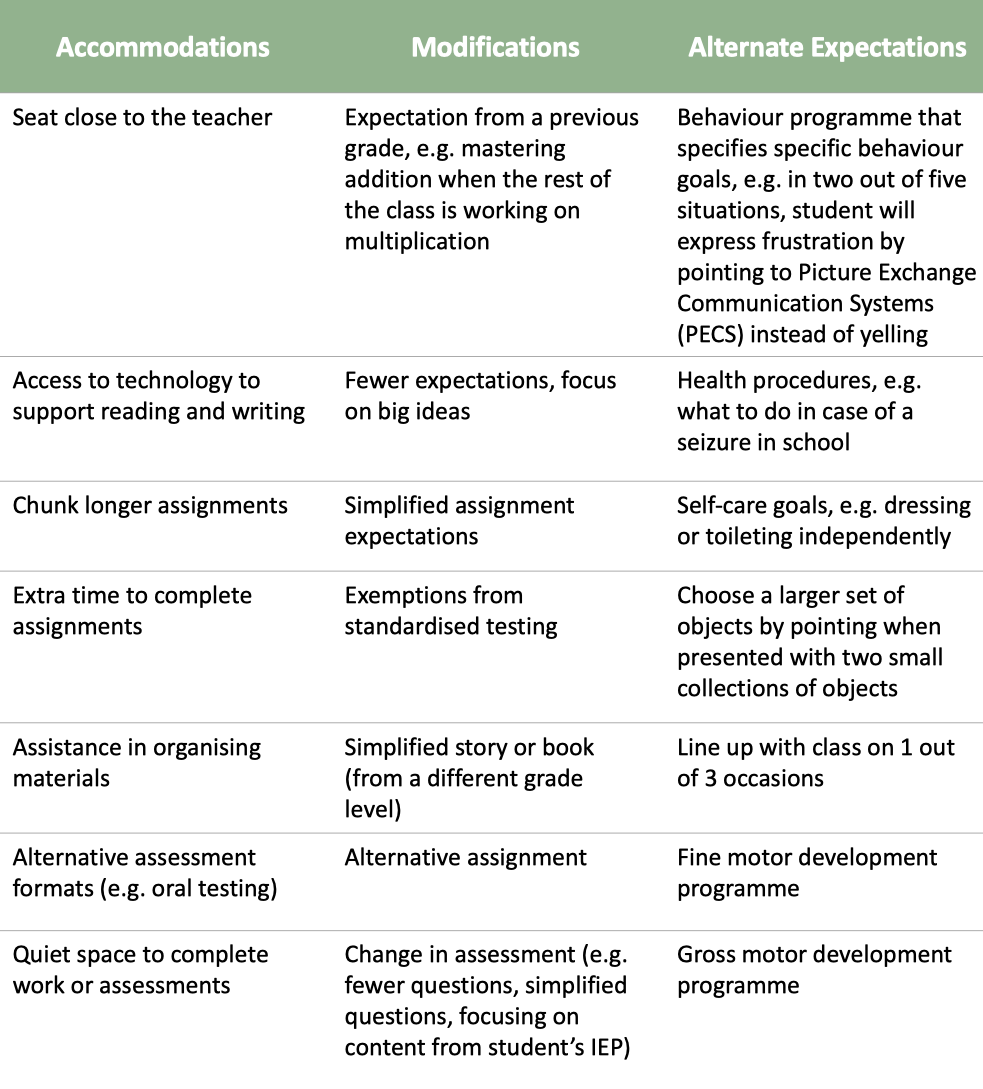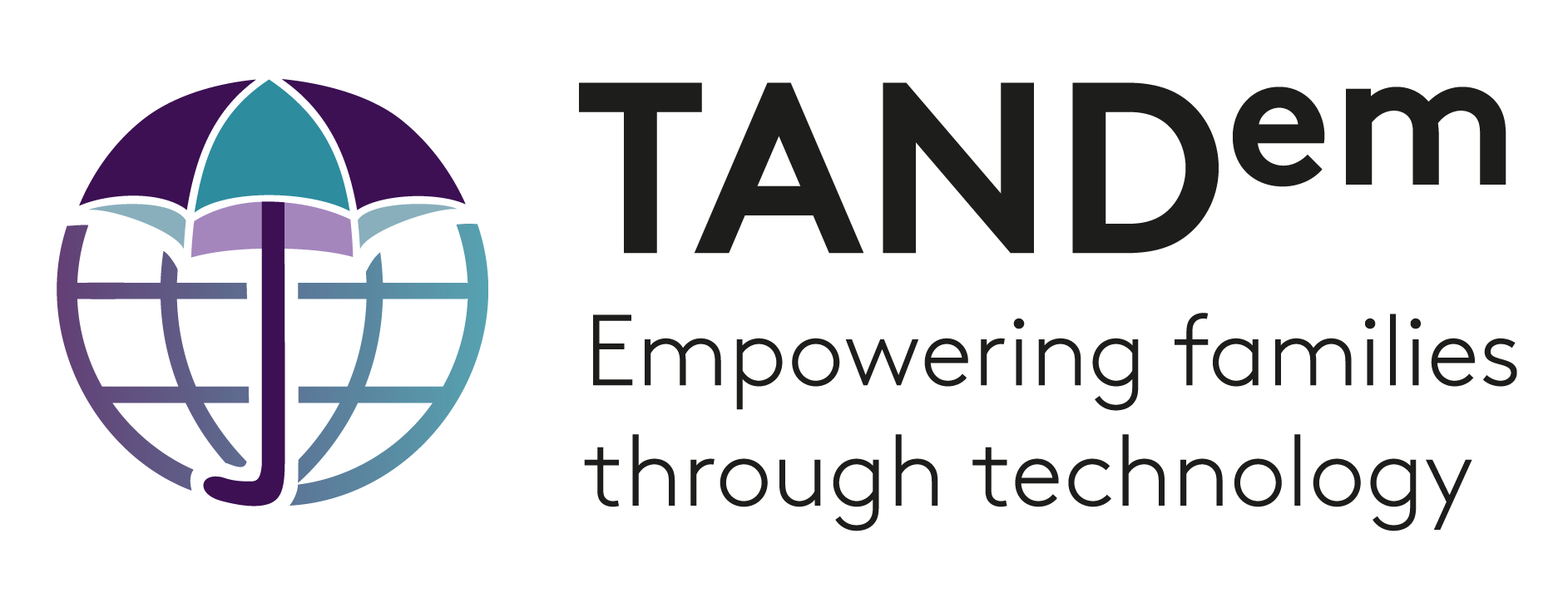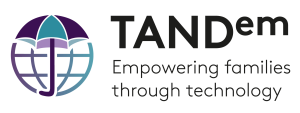Scholastic Cluster
Home > TAND Clusters > Scholastic > What to seek
What to seek
There are four items under the scholastic cluster: reading, writing, spelling and maths. In this cluster, you will find information about these four items, as well as other common issues in education for people with TSC, such as social concerns, bullying, homework, Individual Education Plans (IEPs), assessments and placement options for school.
What kind of school might be appropriate for my child?
One of the first decisions caregivers will need to make is what type of school placement might be best to meet the learning needs and goals of their child. Around the world classroom placement options will vary. See the graphic below for different types of school placements. When considering what type of educational placement is most appropriate for a student, many factors must be considered. In general, the goal is to place students in an inclusive setting in the least restrictive environment, that is, in a setting that is most similar to a regular classroom in a community school, with appropriate support and programming. This is not always possible however, as some students have severe or profound intellectual disabilities that would prevent them from benefiting from a regular class setting. In these cases, parents, caregivers and educators may opt for an alternative placement, outside of an inclusive classroom.
Reach out to your local school to discuss potential placement options for your child. The resources in the resource panel can help to navigate this process.

Accessing Early Childhood Services and Navigating the Education System
[tscalliance.org]
How to Navigate the Special Education System
[tscalliance.org]
Intellectual abilities
Many people with TSC struggle with scholastic skills. There is a wide range of intellectual abilities for people with TSC from above average to intellectual disability ranging from mild to severe. Regardless of intellectual disability, many people with TSC have uneven skill sets in academics, and this can cause difficulty in school. Some people with TSC have specific learning disabilities, with or without intellectual disability.
Understanding Learning Disabilities
[idatschool.ca]
Intellectual Disability (ID)
An Intellectual Disability is diagnosed on the basis of intellectual functioning (usually a full scale IQ score of 70 or below), as well as impaired adaptive functioning (such as activities in daily life, independent living, self care etc). Intellectual Disability is categorised by severity from Mild (sometimes called MID), to moderate, to severe, to profound. The diagnostic criteria for severity relies not just on IQ scales, but on adaptive functioning and support needed in everyday life.
Learning Disorder (LD)
In contrast, a Learning Disorder (LD) represents a specific difficulty in one or more areas, but with an often average or even above average overall IQ.
Learning disabilities are further divided into subcategories, depending on the area that is impacted:
- Dyslexia – learning disorder in reading.
- Dysgraphia – learning disorder characterised by difficulty in writing; either in spelling or composition.
- Dyscalculia – learning disorder in learning maths.
Intellectual disabilities
Approximately half of children with TSC have a severe intellectual disability. For these students, school goals may not be focused on specific academic subjects, but rather may be more focused on communication, goals of daily living and self-care for example.
Literacy and mathematics can still be part of the programme that these students partake in, however different it may look from the mandated curriculum for a particular grade. For example, a student who is nonverbal may still very much enjoy listening to stories read out loud, and may learn to respond to stories read out loud through choosing a symbol such as a face to indicate enjoyment.
In math, students may be working towards consolidating their understanding of quantity. Goals for students with moderate to severe intellectual disability might be focused on understanding small quantities, sorting objects based on attributes, communicating an understanding of numerosity through gesturing, pointing or a choice board. The instructional programme must have clear goals, and educators must consistently bring the math to the students in ways that they are able to develop their own understanding of the content.
School aged individuals with TSC who have intellectual disabilities must have an Individual Education Plan (IEP) that sets out clear goals that are appropriate and attainable for their educational goals. These goals should be revisited and the IEP should be considered a living document that can be updated to ensure they are targeted towards the student’s progress.
Individual Education Plans (IEPs)
In order to meet the sometimes complex academic, social and behavioural issues children with TSC may present with at school, an Individual Education Plan, often called an IEP may be needed. The purpose of an IEP is to offer accommodations or modifications to a student’s programming or environment in order to help them access the curriculum and be successful.
TAND101: Who is at Risk and What You Need to Know Before Your First IEP
[tscalliance.org]
Individual Education Plan (IEP)
This is a legal document outlining an education plan created for a specific student with a disability. It should include current level of functioning, educational accommodations and supports, educational goals, changes to the academic curriculum, and specific services provided for the student.
Any individual with TSC may benefit from an IEP. When a student has difficulty in school, sometimes an IEP is created. An IEP can be a change in the content a child is learning (modification) or a change in how the child approaches the content (accommodation), or it can be an alternate expectation that is not contained in mandated curriculum (alternative expectation).
An example of a modification might be content from a previous grade, or simplified content (for example, the child may be in grade 6 but working on mastering a grade 3 math concept). An accommodation does not change the content, but could be changes such as using a word processor for written output, a seat close to the teacher or having work chunked into smaller parts. An alternative programme is sometimes developed when the goals are around daily living or behaviour. For example, learning to dress themselves, or learning to line up for recess without hitting could be alternative program goals.
Sometimes an IEP will have specific health and safety plans written into them, for example an epilepsy plan. The goals on an IEP are set up individually based on the students’ needs. IEPs are meant to be living documents that can evolve based on a child’s changing needs.
IEPs are developed by the classroom teacher, with input from special education teachers, educational assistants and input from caregivers. When there are assessments and reports from other professionals (psychologists, occupational therapists, etc.), these are used to help inform the IEP. IEPs are working documents, so should be revisited if something is not working. Reach out to your school team to discuss your child’s IEP.
Modification
A change to the academic curriculum, usually in complexity of material or level of learning expectations.
Accommodation
Supports that enable a student to access the regular academic curriculum.
Alternate Programme
A separate programme from the regular academic curriculum that may focus on teaching skills that are not covered in the regular curriculum.
Examples of accommodations, modifications and alternate expectations are presented below.

Assessments
You may need to seek an evaluation (this could be a psycho-educational assessment, or other cognitive testing) to get an idea of areas that are strengths and areas that your child may need additional support, such as reading, writing, spelling and maths. Some schools offer this, while in other areas you may need to contact your primary physician for a referral. For more information about possible assessments, see the Neuropsychological Cluster linked in the resource panel.
Neuropsychological Cluster: What to Seek
[tandtoolkit.org]
Social skills, bullying
Ask your school for social supports for your child if they struggle with building social relationships. People with TSC sometimes struggle socially, and may have difficulty socially in school. If your child is having difficulty, reach out to your school team right away for support. They may be able to pair your child with a potential peer, or perhaps set up a social skills group to support your child. Bullying can happen as well. Listen to your child for signs that they have been targeted or are not having a positive experience. Work with the school to get support. More information about social relationships can be found in the psychosocial cluster and the autism-like cluster, see the resource panel.



